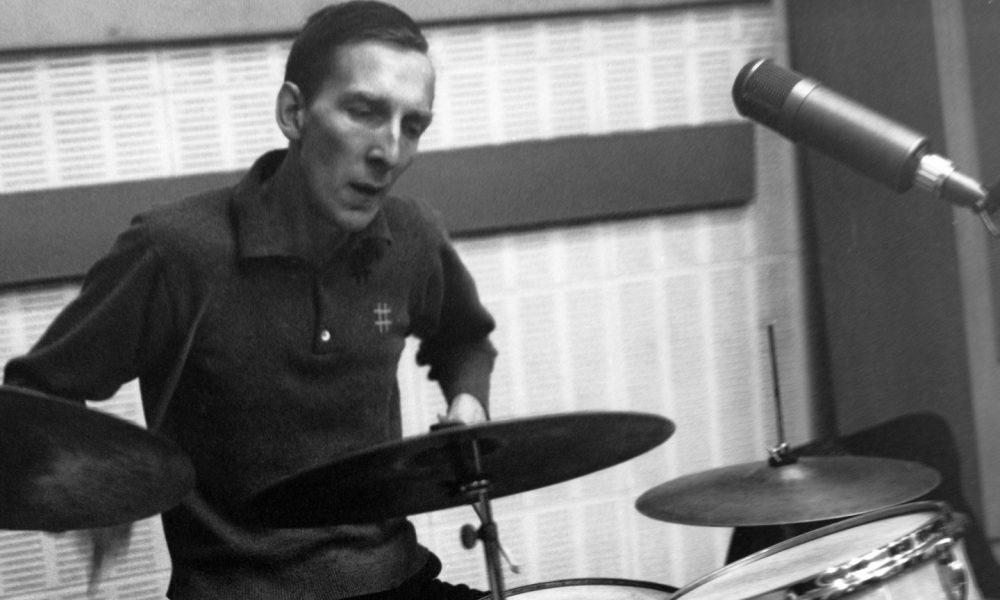Biography Of ‘Britain’s Greatest Jazz Drummer’ Phil Seamen Features Foreword By Charlie Watts
‘Phil was my idol, and he influenced a whole new generation of drummers,’ said Watts.

A biography of the late Phil Seamen, described by London club owner and musician Ronnie Scott as “Britain’s greatest jazz drummer,” is out now. The expansive volume, Percussion Genius, is written by Peter Dawn, who writes on Instagram: “It has taken almost twenty years since I commenced the research to write Phil’s story. And what a story!”
‘Phil was my idol’
The book’s foreword was written by the Rolling Stones’ late drummer Charlie Watts, who knew him from his early days playing with Alexis Korner and would often eulogize about Seamen in interviews. “Phil was my idol, and he influenced a whole new generation of drummers,” he enthused. “There is a legacy of players who emanate from Phil. [He’s] the best drummer we’ve ever had. Totally unique and what a life he led.”
Dawn, who like his biographical subject was born in Burton-on-Trent, began to develop the book project on his retirement in 2005, and to collate as many of Seamen’s recordings as possible. He started what became a total of 200 interviews for it around 2011. On philseamen.com, Dawn tells journalist Chris Welch, who himself interviewed Seamen on several occasions: “It was like a jigsaw putting the pieces together, with one person leading to another.
“Although I didn’t realise it at the time, I was fortunate that some of the early people Phil had played with, were still alive. While the ‘scent was hot,’ I carried on interviewing rather than break off to transcribe them. The British Library’s Oral History of British Jazz series of interviews I discovered, contained recollections of many more people he had played with who had passed away.” The book can be bought here.
‘Changed my playing overnight’
Another departed contemporary who spoke often of Seamen’s influence was Ginger Baker, who was under his tutelage in the early 1960s and would recruit him for his post-Cream band Air Force. Said Baker: “When Phil played me his African records it opened up a whole new world and changed my playing overnight. It saved me twenty years in three months.” Others whose own style was shaped by Seamen’s pre-eminence included Keith Moon, Jon Hiseman, and Mitch Mitchell.
Seamen was born in 1926 and became an early disciple of jazz records, and of drummers such as Gene Krupa. After turning professional at the age of 19, Seamen’s brilliance at the kit ensured his rapid emergence, rising from Nat Gonella’s Georgians to the Joe Loss Orchestra and then Jack Parnell’s band, playing behind Billie Holiday at the Royal Albert Hall.
He became a follower of the be-bop idiom and, sadly, developed a heroin addiction that he shared with many jazz players. Seamen made several albums in his own name, including Now…Live! For the Verve label, released in 1968. He also played on Georgie Fame’s 1966 UK Top 10 album Sound Venture.
As Baker observed, Seamen was an early adopter of African rhythms in his playing, as well as music from south America and the Caribbean. He played with kindred spirits such as Scott, Tubby Hayes, Stan Tracey, Dick Morrissey, and John Stevens, and on studio sessions by the likes of Donovan and Acker Bilk. Long hampered by his drug-related lifestyle, he died in 1972, at the age of just 46. With thanks to phil.seamen.com.
Test your knowledge with the uDiscover Music Jazz Quiz.












